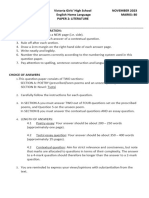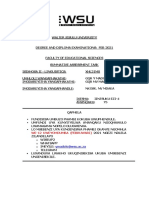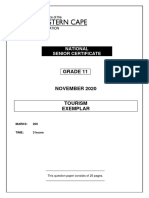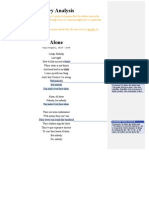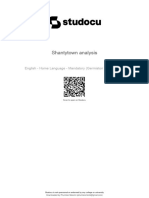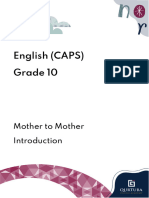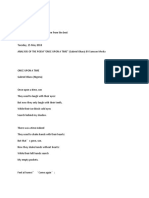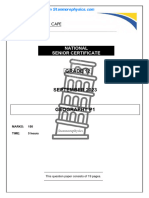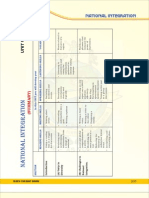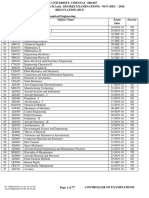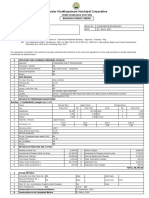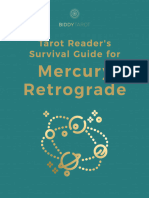The Dry Grass Sings
The Dry Grass Sings
Uploaded by
mapsyonelaCopyright:
Available Formats
The Dry Grass Sings
The Dry Grass Sings
Uploaded by
mapsyonelaOriginal Title
Copyright
Available Formats
Share this document
Did you find this document useful?
Is this content inappropriate?
Copyright:
Available Formats
The Dry Grass Sings
The Dry Grass Sings
Uploaded by
mapsyonelaCopyright:
Available Formats
The Dry Grass Sings
By Stephen Gray
This poem is about Africa before and after the rain.
When the sky’s as hot as a baking pot Simile: The sky is so hot
Stanza 1:
that it feels like you will
This mostly speaks And the whole earth shrinks like a skin bake under it.
about dryness and
The mopane leaves clap and the eagle cries
heat, and the effect Simile: The ground is so
this has on the plants. The turtles snap and the thorn-trees scratch dry that it seems like it is
And the dry grass sings and sings. shrivelling up as if it is a
Personification and dead animal skin.
onomatopoeia: The
leaves make a clapping On the crackling mud the crocodile smiles Stanza 2:
sound as they hit each This shows the
And the kudu snort in the dust unhappiness of the
other in the wind.
And the zebras grunt and the jackals howl animals.
Personification and
onomatopoeia: Loud And the elephants trudge for another mile
heavy steps taken when And the dry grass sings and sings. Personification: The
you’re exhausted. crocodile smiles because
it is getting the last little
But when lightning strikes and the clouds drop bit of coolness by lying
in the mud.
Stanza 3: down
Animals and plants The clouds are made of
And the whole earth drinks from the sky water, so it seems that
are relieved because it
has rained.
The wood dove purrs and the fever-trees sigh they are dropping when
the water comes out as
And the rivers roll as heavy as blood rain.
And the dry grass sings no more.
Personification: The Simile: The rain is falling so
ground is absorbing all fast that the rivers can’t keep
the water because it is so Personification and onomatopoeia: The trees are up and the water flows heavy
dry – it is “thirsty”. relieved because they have received water. and fast.
“The dry grass sings”
Personification: The grass is dry, so it makes a sound as the wind blows it and it rubs together. At
the end of the poem, the grass no longer sings because it is no longer dry, so it no longer makes the
same sound that it did before.
Sounds in the poem Repetition in the poem
“And the dry grass sings and sings” is repeated to
Stanzas 1-2: Sounds are frustrated and emphasise the sudden change in the last stanza because
unhappy, e.g. snort, grunt, howl, cries etc. it has finally rained.
Stanza 3: Sounds are relieved, e.g. purr, sigh Because this line was repeated, the change is more
noticeable and obvious.
You might also like
- VGHS Grade 11 Paper 2 Literature QP NOV 2023Document10 pagesVGHS Grade 11 Paper 2 Literature QP NOV 2023Laura Kelly Williams100% (1)
- The Dry Grass Sings MemoDocument2 pagesThe Dry Grass Sings Memocarabritz25No ratings yet
- Diary Entry Written WorkDocument7 pagesDiary Entry Written WorkKaashvi AroraNo ratings yet
- Poem He Wishes For Cloths of HeavenDocument4 pagesPoem He Wishes For Cloths of HeavenNF DELUXNo ratings yet
- By Your Own Definition Poem 1Document12 pagesBy Your Own Definition Poem 1calistaphobicNo ratings yet
- Boy Who Painted MemoDocument2 pagesBoy Who Painted MemoKgaugelo ClementNo ratings yet
- Her Three DaysDocument13 pagesHer Three Daysmike.coetzee92No ratings yet
- Poetry BookletDocument23 pagesPoetry Bookletjust4.goatedNo ratings yet
- Grade 11 Exam Demarcation Nov 2023Document11 pagesGrade 11 Exam Demarcation Nov 2023rhulanikhoza16No ratings yet
- Soccer Karoo Style by Clive Lawrance EditDocument13 pagesSoccer Karoo Style by Clive Lawrance EditelysianzoeeNo ratings yet
- English Fal Week 3 Grade 11Document8 pagesEnglish Fal Week 3 Grade 11kgopovalenciaNo ratings yet
- By Die Robot in Eerstelaan Notes (Portal) EnglishDocument23 pagesBy Die Robot in Eerstelaan Notes (Portal) Englishzaferismailasvat1786No ratings yet
- Poetry Namaqualand After The RainDocument17 pagesPoetry Namaqualand After The Rainthandolwethuu.zondii100% (1)
- TOURISM GR11 MEMO NOV2022 - EnglishDocument10 pagesTOURISM GR11 MEMO NOV2022 - EnglishBrendanNo ratings yet
- Grade 10 Poetry GuideDocument54 pagesGrade 10 Poetry GuidegraciazendahNo ratings yet
- Eating PoetryDocument14 pagesEating PoetryMilan SewdassNo ratings yet
- Remains by Simon ArmitageDocument12 pagesRemains by Simon Armitagelimited humanNo ratings yet
- Reapers in A MieliefieldDocument14 pagesReapers in A Mieliefieldyqxbz5x698No ratings yet
- GR 11 Tourism November 2022 Qp-1Document23 pagesGR 11 Tourism November 2022 Qp-1kwanelekwanokuhleNo ratings yet
- 2006 Grade 10 English HL Paper 1 November National DBE Exemplar MemorandumDocument6 pages2006 Grade 10 English HL Paper 1 November National DBE Exemplar Memorandumjeannotlusiku1No ratings yet
- IsiXhosa II - Linguistics Summative Assessment Task - RevisedDocument2 pagesIsiXhosa II - Linguistics Summative Assessment Task - Revisedmbanjwa0% (1)
- Aedh Wishes For The Cloths of Heaven - Poem PDFDocument3 pagesAedh Wishes For The Cloths of Heaven - Poem PDFdukespecialNo ratings yet
- The Right WordDocument17 pagesThe Right Wordnomvulapetunia460No ratings yet
- Tourism Gr11 QP Nov2020 EnglishDocument25 pagesTourism Gr11 QP Nov2020 Englishreconcilemalele3No ratings yet
- English HL P2 May-June 2023Document27 pagesEnglish HL P2 May-June 2023ndzamelasinoNo ratings yet
- Graad 8 - Geskiedenis - Kwartaal 4Document10 pagesGraad 8 - Geskiedenis - Kwartaal 4Desiree CronjeNo ratings yet
- The Right Word by Imtiaz DharkerDocument1 pageThe Right Word by Imtiaz DharkerPritam KumarNo ratings yet
- Poetry AnalysisDocument3 pagesPoetry Analysisapi-264838510100% (1)
- GR 10 Eng FAL Paper 2 Lit MEMO June 2018Document6 pagesGR 10 Eng FAL Paper 2 Lit MEMO June 2018Fkay LepeleNo ratings yet
- Grade 10 Engfa Poetry Study GuideDocument59 pagesGrade 10 Engfa Poetry Study Guidendamulelotshikovhi09No ratings yet
- Lo Controlled Test Term 2 GR 11Document9 pagesLo Controlled Test Term 2 GR 11sa961296No ratings yet
- Shantytown AnalysisDocument11 pagesShantytown Analysisphumlanim633100% (1)
- Sleeping Black Boy 1Document9 pagesSleeping Black Boy 1bullet4purrp125No ratings yet
- Tsotsi1 Wordpress Com Character-AnalysisDocument7 pagesTsotsi1 Wordpress Com Character-AnalysisSamantha ChitongoNo ratings yet
- 1707076540023-3.4. Mother To Mother - IntroductionDocument9 pages1707076540023-3.4. Mother To Mother - Introductionatllai00150% (2)
- GR 8 ENG FAL 2 VRAESTEL & MEMO - KvLdSwbRU6I6sv54hBFhDocument15 pagesGR 8 ENG FAL 2 VRAESTEL & MEMO - KvLdSwbRU6I6sv54hBFhRinku GhoshNo ratings yet
- SUMMARY OF THE TSOTSI STORY - Abnah AcademyDocument2 pagesSUMMARY OF THE TSOTSI STORY - Abnah Academyamandamabuza81No ratings yet
- Those Winter Sundays: by Robert HaydenDocument11 pagesThose Winter Sundays: by Robert HaydenRossanna VilardoNo ratings yet
- Kinds of Poetry: 1-PastrolDocument3 pagesKinds of Poetry: 1-Pastrolhodhod2No ratings yet
- EFAL POETRY QuestionsDocument20 pagesEFAL POETRY QuestionsLethukuthula MbathaNo ratings yet
- I Sit and Look OutDocument1 pageI Sit and Look Outapi-200144934No ratings yet
- Efal Grade 10 P2 QP 2024 FinalDocument22 pagesEfal Grade 10 P2 QP 2024 FinalFkay LepeleNo ratings yet
- Ithubalethu Secondary Scool English P2 20224Document9 pagesIthubalethu Secondary Scool English P2 20224geraldinethabedeNo ratings yet
- GR 10 - Term 2 Plate TectonicsDocument9 pagesGR 10 - Term 2 Plate TectonicsNazeera DawoodNo ratings yet
- Grade 11 Poetry 2o2o 2Document25 pagesGrade 11 Poetry 2o2o 2vwnhmygkf9100% (1)
- Question 5 Textual Editing Booklet - by Mrs C Van NiekerkDocument39 pagesQuestion 5 Textual Editing Booklet - by Mrs C Van Niekerkebertvdm2100% (1)
- An African ThunderstormDocument24 pagesAn African ThunderstormQuincy ThomasNo ratings yet
- 2023 MARKING GUIDELINES Dreaming of LightDocument30 pages2023 MARKING GUIDELINES Dreaming of LightangelinalehanieNo ratings yet
- Samwiterson AcaDocument14 pagesSamwiterson AcaAssej Mae Pascua villa50% (2)
- English FAL P3 Grade 10 Nov 2017 MemoDocument10 pagesEnglish FAL P3 Grade 10 Nov 2017 MemosikandarbatchaNo ratings yet
- EC Geography Grade 12 September 2023 P1 and MemoDocument29 pagesEC Geography Grade 12 September 2023 P1 and Memomalambulempendulo32No ratings yet
- Sleeping BoyDocument7 pagesSleeping Boyasamoahshemaiah100% (1)
- Teachers Manual KZN DRAMA QUESTIONS JUNE 2017 English FAL P2-1Document26 pagesTeachers Manual KZN DRAMA QUESTIONS JUNE 2017 English FAL P2-17crhc7jy9jNo ratings yet
- Hard To Find - Sinesipo JojoDocument15 pagesHard To Find - Sinesipo Jojothabisoandile.celeNo ratings yet
- Engfal P2 GR11 Memo Nov2019 DDocument17 pagesEngfal P2 GR11 Memo Nov2019 Dtheodorahcarino759No ratings yet
- Grade 12 Task 4 2023Document6 pagesGrade 12 Task 4 2023Mbatha PhumzileNo ratings yet
- QUESTIONS - Buckingham Palace District Six - MorningDocument4 pagesQUESTIONS - Buckingham Palace District Six - Morningmmabizela2010No ratings yet
- On Imagery and SymbolismDocument4 pagesOn Imagery and SymbolismMARY ANN ILLANANo ratings yet
- Blank 2Document2 pagesBlank 2Sohom GuptaNo ratings yet
- The Poplar-Field, William CowperDocument4 pagesThe Poplar-Field, William CowperMary ANo ratings yet
- IIBM Institute of Business Management PDFDocument12 pagesIIBM Institute of Business Management PDFNarendra Chaurasia100% (1)
- Tutorial 4Document17 pagesTutorial 4Mariz Ellaine BaltazarNo ratings yet
- Preheater Bricks QualityDocument1 pagePreheater Bricks QualityVenkata Subbareddy PoluNo ratings yet
- Unsw Mechanical Engineering Thesis DatabaseDocument5 pagesUnsw Mechanical Engineering Thesis Databaselucienicolasstockton100% (2)
- Volume 7 Numro 1 Article 8Document7 pagesVolume 7 Numro 1 Article 8vila thierryNo ratings yet
- Celt 226 ActivelearningtechniquesDocument13 pagesCelt 226 Activelearningtechniquesapi-608094740No ratings yet
- Ragusa Soldati and UniformiDocument40 pagesRagusa Soldati and UniformiMiguel Trindade100% (1)
- BBPW 3103 (Assignmemt)Document17 pagesBBPW 3103 (Assignmemt)jesson kimNo ratings yet
- Engineering Materials Lab ManualDocument14 pagesEngineering Materials Lab ManualHarood Nishat100% (1)
- b16.9 InterpretationsDocument8 pagesb16.9 InterpretationsjojeecaresNo ratings yet
- How To Achieve Academic Success 1Document3 pagesHow To Achieve Academic Success 1api-644660894No ratings yet
- Unit 6 Main Course BookDocument61 pagesUnit 6 Main Course Bookvivekkkkkkk0% (1)
- Time Series AnalysisDocument124 pagesTime Series AnalysishtapiaqNo ratings yet
- MDD4N20YDocument6 pagesMDD4N20YAmc Forklift ElektrikNo ratings yet
- AUStudentHelp Anna University Chennai R2013 Time Table Nov Dec 2016 Min PDFDocument77 pagesAUStudentHelp Anna University Chennai R2013 Time Table Nov Dec 2016 Min PDFSundar Rajan ANo ratings yet
- Nanobiotechnology and Its Applications in Medical Diagnostics and Biomedical Field 1Document49 pagesNanobiotechnology and Its Applications in Medical Diagnostics and Biomedical Field 1Pranshu AbhishekNo ratings yet
- 1 s2.0 S0098135423003745 MainDocument15 pages1 s2.0 S0098135423003745 MainAlexNicolaeNo ratings yet
- Slide Trí Tuệ Nhân Tạo - Lecture04 - CSP - Phạm Bảo Sơn - UETDocument40 pagesSlide Trí Tuệ Nhân Tạo - Lecture04 - CSP - Phạm Bảo Sơn - UETNgocNo ratings yet
- Silabus AI 1Document7 pagesSilabus AI 1Aisyah Nadiatul HikmahNo ratings yet
- 100 CollocationsDocument9 pages100 CollocationsVu VuNo ratings yet
- DOM Lab Manual Regulation 2017Document100 pagesDOM Lab Manual Regulation 2017RakheshNo ratings yet
- Altivar Easy 310 - ATV310HU40N4EDocument7 pagesAltivar Easy 310 - ATV310HU40N4ETùng ĐặngNo ratings yet
- Forced Convenction Lab Report 1. 1 Overview: Done by Ben Claude UWIHANGANYE, Reg. No: ENM311-2672/2016 JKUATDocument10 pagesForced Convenction Lab Report 1. 1 Overview: Done by Ben Claude UWIHANGANYE, Reg. No: ENM311-2672/2016 JKUATEugene100% (1)
- Catalogo Comercial RootsDocument28 pagesCatalogo Comercial Rootsfernando MedinaNo ratings yet
- PC 650 DolaresDocument8 pagesPC 650 DolaresJuan CarlosNo ratings yet
- Timing of Events Through Vimshottari Dasha and Transit of Planets...Document4 pagesTiming of Events Through Vimshottari Dasha and Transit of Planets...nmremala100% (1)
- Flyback Converter DesignDocument2 pagesFlyback Converter DesignCartelNo ratings yet
- English For Acad Quarter 1 Module 1Document3 pagesEnglish For Acad Quarter 1 Module 1Rovelyn FigueroaNo ratings yet
- Greater Visakhapatnam Municipal Corporation: Town Planning Section Building Permit OrderDocument3 pagesGreater Visakhapatnam Municipal Corporation: Town Planning Section Building Permit OrderRaja SekharNo ratings yet
- Biddy Tarot - Mercury Retrograde Prep KitDocument9 pagesBiddy Tarot - Mercury Retrograde Prep Kitmu99leNo ratings yet
